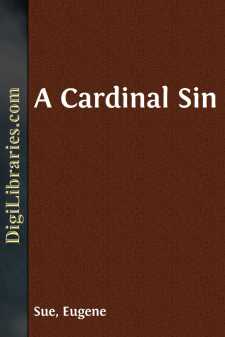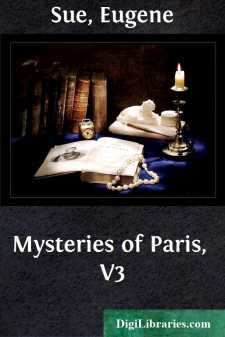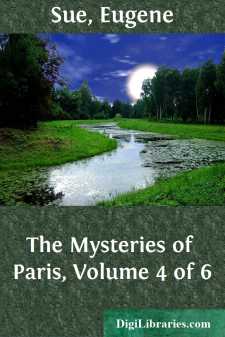Categories
- Antiques & Collectibles 13
- Architecture 36
- Art 48
- Bibles 22
- Biography & Autobiography 813
- Body, Mind & Spirit 142
- Business & Economics 28
- Children's Books 17
- Children's Fiction 14
- Computers 4
- Cooking 94
- Crafts & Hobbies 4
- Drama 346
- Education 46
- Family & Relationships 57
- Fiction 11829
- Games 19
- Gardening 17
- Health & Fitness 34
- History 1377
- House & Home 1
- Humor 147
- Juvenile Fiction 1873
- Juvenile Nonfiction 202
- Language Arts & Disciplines 88
- Law 16
- Literary Collections 686
- Literary Criticism 179
- Mathematics 13
- Medical 41
- Music 40
- Nature 179
- Non-Classifiable 1768
- Performing Arts 7
- Periodicals 1453
- Philosophy 64
- Photography 2
- Poetry 896
- Political Science 203
- Psychology 42
- Reference 154
- Religion 513
- Science 126
- Self-Help 84
- Social Science 81
- Sports & Recreation 34
- Study Aids 3
- Technology & Engineering 59
- Transportation 23
- Travel 463
- True Crime 29
Eugene Sue
Eugene Sue was a 19th-century French novelist best known for his works of social criticism and serialized novels, particularly "The Mysteries of Paris" (1842-1843) and "The Wandering Jew" (1844-1845). His writings, characterized by their vivid portrayals of the struggles of the urban poor, were immensely popular and influential in shaping public opinion and social reform movements in France. Sue's novels often combined melodrama with detailed depictions of contemporary life, earning him a lasting place in the annals of French literature.
Author's Books:
Sort by:
by:
Eugene Sue
A CARDINAL SIN. CHAPTER I. On a beautiful, bright morning of the month of May, 18—, a young girl of eighteen years or thereabouts, whose pale, melancholy face reflected only too plainly the wretchedness and privations of her daily life, was wending her way, timidly and with hesitating steps, through that populous quarter of the city known as the Charnier des Innocents, a dreary spot, principally...
more...
by:
Eugene Sue
THE EXECUTION. The surprised lapidary rose and opened the door. Two men entered the garret. One of them was tall and thin, with a face mean and pimpled, surrounded by thick, grayish whiskers; he held in his hand a stout loaded cane, and wore a shapeless hat and a large green greatcoat, covered with mud, and buttoned close up to the neck; the black velvet collar, much worn, exposed to view his long,...
more...
by:
Eugene Sue
CHAPTER I. IN THE NOTARY'S OFFICE. Brain, or heart of the land, which you will, as large cities are, Paris may claim to have nerves, muscles, and arteries centering in it, which but few capitals, by right of size, passions, horrors, loves, charms, mysteries, in a word, can reveal. To trace its emotions, impulses, secrets, wounds, cankers, joys, the following pages are devoted. We must begin by...
more...
by:
Eugene Sue
THE GUEST. He who writes this account is called Joel, the brenn of the tribe of Karnak; he is the son of Marik, who was the son of Kirio, the son of Tiras, the son of Gomer, the son of Vorr, the son of Glenan, the son of Erer, the son of Roderik chosen chief of the Gallic army that, now two hundred and seventy-seven years ago, levied tribute upon Rome. Gallic word for chief. Joel (why should I not say...
more...
by:
Eugene Sue
THE FOUNTAIN OF THE HINDS. A spring of living water, known in the neighborhood by the appropriate name of the "Fountain of the Hinds," empties its trickling stream under the oaks of one of the most secret recesses of the forest of Compiegne. Stags and hinds, deers and does, bucks and she-goats come to water at the spot, leaving behind them numerous imprints of their steps on the borders of the...
more...
by:
Eugene Sue
CHAPTER I. THE TAPIS-FRANC. It was on a cold and rainy night, towards the end of October, 1838, that a tall and powerful man, with an old broad-brimmed straw hat upon his head, and clad in a blue cotton carter's frock, which hung loosely over trousers of the same material, crossed the Pont au Change, and darted with a hasty step into the Cité, that labyrinth of obscure, narrow, and winding...
more...
by:
Eugene Sue
CHAPTER I. THE BALL. Belonging to one of the first families in France, still young, and with a face that would have been agreeable had it not been for the almost ridiculous and disproportionate length of his nose, M. de Lucenay joined to a restless love of constant motion the habit of talking and laughing fearfully loud upon subjects quite at variance with good taste or polished manners, and throwing...
more...
by:
Eugene Sue
CHAPTER I. THE TEMPLE. To the deep snow which had fallen during the past night had succeeded a very sharp wind, so that the ordinarily muddy pavement was hard and dry, as Rigolette and Rodolph wended onwards to the immense and singular bazar called the Temple, the young girl leaning unceremoniously on the arm of her cavalier, who, on his part, appeared as much at his ease as though they had been old...
more...
by:
Eugene Sue
CHAPTER I. RIGOLETTE'S FIRST SORROW. Rigolette's apartment was still in all its extreme nicety; the large silver watch placed over the mantelpiece, in a small boxwood stand, denoted the hour of four. The severe cold weather having ceased, the thrifty little needlewoman had not lighted her stove. From the window, a corner of blue sky was scarcely perceptible over the masses of irregularly...
more...
by:
Eugene Sue
CHAPTER I. THE PRESENTATION. A few days after the murder of Madame Séraphin, the death of the Chouette, and the arrest of the gang of desperadoes taken by surprise at Bras-Rouge's house, Rodolph paid another visit to the house in the Rue du Temple. We have already observed that, with the view of practising artifice for artifice with Jacques Ferrand, discovering his hidden crimes, obliging him to...
more...











